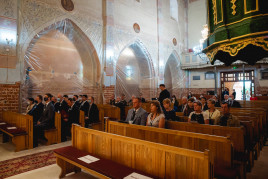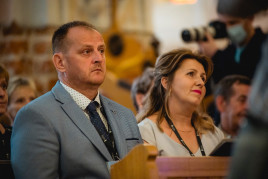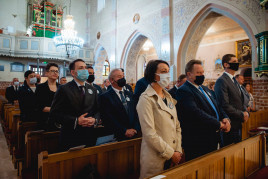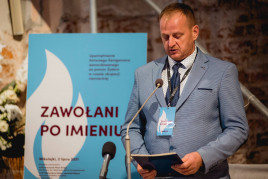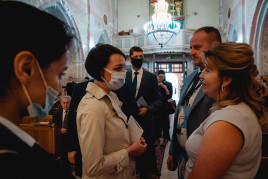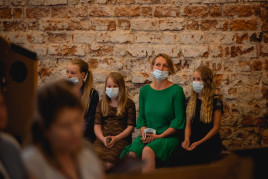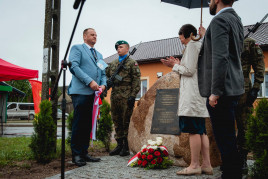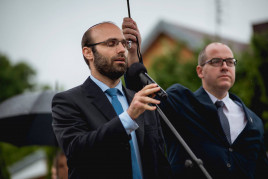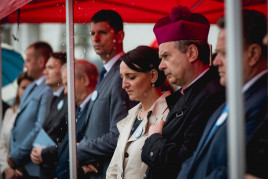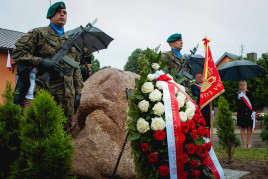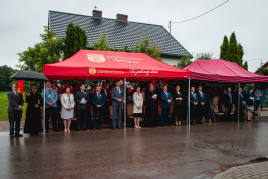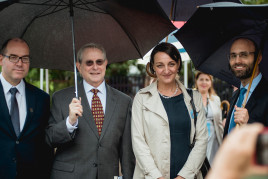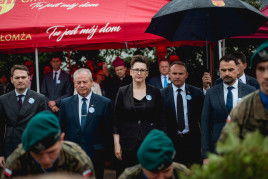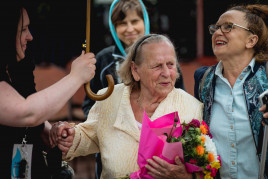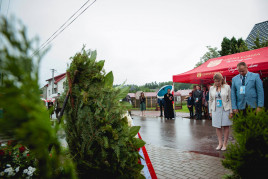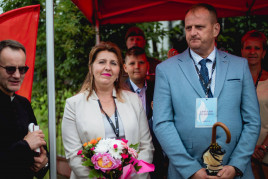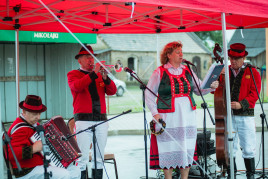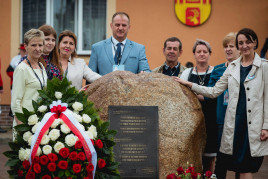Antoni Kenigsman commemorated for assisting Jews - Instytut Pileckiego
Antoni Kenigsman commemorated for assisting Jews
During the 20th commemoration ceremony as part of the “Called by Name” project, we honored the memory of Antoni Kenigsman, who was murdered by the Germans in 1942 for aiding three Jews.
In 1942, Antoni Kenigsman was 40 years old. He kept a small farm in the village of Mikołajki near Łomża with his wife Czesława and their daughter Genowefa. When three Jewish refugees from the ghetto knocked on their door, the Kenigsmans decided to help them despite the danger. They provided the merchant from Łomża and the adolescents with food and a place to spend the night. One morning in May 1942, two trucks carrying German gendarmes drove up to the Kenigsman farm. Czesława and Genowefa were able to escape through a window, but the Germans discovered the Jews in hiding when they searched the property. The merchant from Łomża, a 60-year-old man by the name of Całka, was shot on site. The boy and girl were tortured. When Antoni returned home, completely unaware of what was happening, he was also caught and beaten. The half-conscious man was dragged to one of the trucks and then shot on the roadside on the way to the village of Chojny. The Germans murdered the other two Jews in a nearby forest. Czesława and Genowefa died under unknown circumstances in July 1946.
The ceremony during which the Pilecki Institute commemorated Antoni Kenigsman began with Holy Mass led by Bishop Tadeusz Bronakowski at the Church of St. Adalbert in Szczepankowo.
A commemorative plaque to the memory of Antoni Kenigsman was unveiled jointly by Wojciech Kenigsman, Antoni’s grandnephew, and Prof. Magdalena Gawin, the Deputy Minister of Culture and National Heritage and the initiator of the “Called by Name” project. The location of the monument stone was blessed by the Right Reverend Tadeusz Bronakowski and the parson of the Szczepankowo parish, Father Dariusz Wizner. Rabbi Oriel Zaretsky spoke a prayer for the deceased on behalf of the Jewish community.
"As members of the family, we are proud that the story from those times, hidden for so many years, has at last seen the light of day. [...] Our task, and the task of the generations to come, must be to cultivate and transfer the truth about heroes such as Antoni – about their goodness and their willingness to lend aid to those in need," said Wojciech, a relative of Antoni Kenigsman.
Wojciech Kozłowski, the director of the Pilecki Institute, highlighted multidimensionality in a speech: “We are not meeting today necessarily to mourn Antoni Kenigsman, but to celebrate an important event that continues to exist in several facets: in our memory of the Second World War, in the family’s memory, and in the national memory. On the other hand, this celebration has a deep moral dimension. During the two years of the ‘Called by Name’ project, I have gradually come to discover this extremely important element that goes beyond historical experience.”
Prof. Magdalena Gawin, the Deputy Minister of Culture and National Heritage, who initiated the “Called by Name” project, stressed that the project is focused on the extraordinary actions of ordinary people: “Each ceremony is a great event, for myself included, because I have a deep sense that something very important is happening. We are restoring memory, respect, and justice. And we are not talking here about leading politicians, but about so-called ‘ordinary people’. Ordinary people with great hearts (...). We are here to stand on the side of good, to thank the family for preserving his memory, and to tell Antoni’s loved ones that they will never be alone again.”
The event was co-organized by the Pilecki Institute, headed by Dr. Wojciech Kozłowski and Anna Gutkowska; the Ministry of Culture and National Heritage; Piotr Kłys, the head of the Łomża commune; and Lech Marek Szabłowski, the starost of Łomża.
